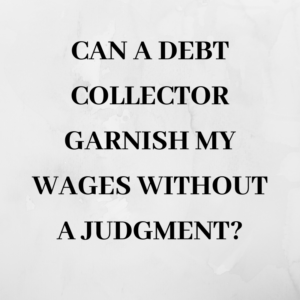Can a debt collector garnish my wages without a judgment?
“Can a debt collector garnish my wages without a judgment?”
 A big part of my job is dealing with debt collectors, and helping consumers deal with debt collectors in Alabama.
A big part of my job is dealing with debt collectors, and helping consumers deal with debt collectors in Alabama.
This question comes up often when we’re talking with consumers, so we thought we would answer it here.
Garnishment means taking your money. So wage garnishment is where a percentage (usually 25%) of your wages is withheld from each paycheck. That money gets sent to the court. Who then sends it to the collection lawyer who then sends it to the debt collector.
There are a couple of questions we want to ask when a collector threatens to garnish your wages.
The first question is whether or not you have a judgment against you.
If they have one against you, then they are more than likely to be able to garnish your wages. Unless your wages are low enough that they are exempt from wage garnishment.
If you are unsure whether there is a judgment, we can find a case filed against you in Alabama. Then we can see if there is a judgment. (If there is a judgment, we will help you make sure the judgment is valid — otherwise it can be attacked).
If they don’t have a judgment against you, then we ask if the debt is a federal debt, like a student loan.
Sometimes these guys can go through an administrative process, where they take the right steps and can garnish your wages.
So a defaulted federal student loan can lead to wage garnishment.
If you owe money on a SBA (Small Business Administration) loan, this may lead to a wage garnishment.
However, if we’re just dealing with companies like Midland Funding, LVNV, Portfolio Recovery Associates, etc. and they’re threatening to garnish your wages, there’s a problem.
These are debt collectors (debt buyers usually) and they are restricted by the FDCPA (Fair Debt Collection Practices Act). This powerful law forbids debt collectors from lying to you or acting an unfair or harassing manner towards you.
So when these types of companies threaten to garnish your wages, what exactly did they say?
“If you don’t pay us by the 30th, we will have to garnish your wages” — that’s illegal unless they have a judgment.
“We are going to contact your employer to find out how much you make and give them a heads up we will be garnishing your paycheck”. If no judgment, then you need to consider suing the jerk debt collection company that said this to you.
Now if they say something like, “If you don’t pay and if we sue and if we win, then we will garnish you” that’s fine. As long as they have the right to sue (often they don’t).
Bottom line is when they lie, they need to be sued.
If they do garnish without a judgment, that’s unfair and harassing. Same answer — sue them for money damages.
What will I get if I sue a lying or harassing debt collector under the FDCPA for illegally threatening to garnish me?
You get a number of good things.
First, you get actual (compensatory) damages. This is an amount of money to make you whole — to make up for the harm you have suffered. Sometimes this is for economic damages — you lost a job, for example. Most of the time it is non-economic damages such as emotional distress. It is very upsetting to almost anyone to have a debt collector lie and treat you unfairly. Sometimes the amount is a few thousand dollars and sometimes it is in the six figure range.
Second, you can get statutory damages of up to $1,000. These are damages even if you were not hurt or harmed by the debt collector. This is to give you an incentive to bring any case even if not harmed.
Third, you get attorney fees so hiring a lawyer does not cost you any money. The debt collector has to pay your lawyer.
Finally, you get your costs and expenses paid — this is money your lawyer spent prosecuting your case. Taking depositions, filing fees, etc. The debt collector you sued has to pay this.
Bonus: Sometimes (actually almost always) we sue under state law also and this can give us punitive damages. There are two reasons for punitive damages. First, is to punish the debt collector for breaking the law in an intentional or reckless manner. Second, to discourage the debt collector (and other collectors) from ever breaking the law again.
Bottom line — if a debt collector is threatening wage garnishment without having a judgment, look at suing them!
Don’t let them get away with this. They are not just mistreating you but also mistreating many others. You help yourself and you help others by suing the bad guys.
Talk to you soon!
John Watts